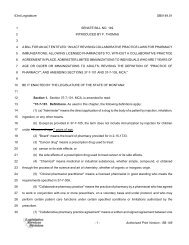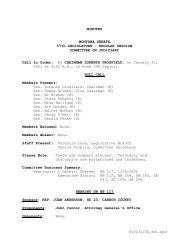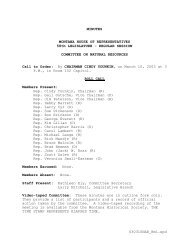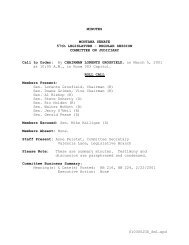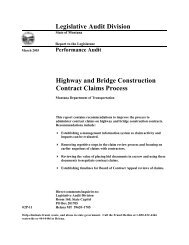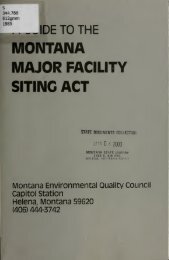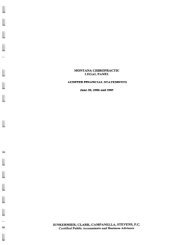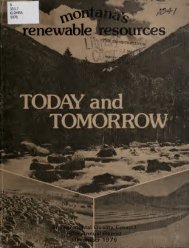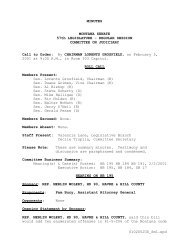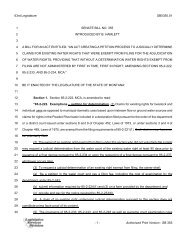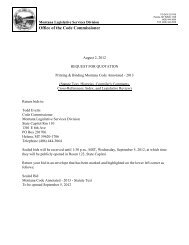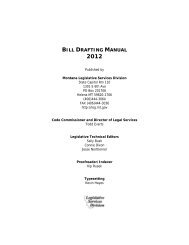Public Comment. Volume III - Montana Legislature
Public Comment. Volume III - Montana Legislature
Public Comment. Volume III - Montana Legislature
Create successful ePaper yourself
Turn your PDF publications into a flip-book with our unique Google optimized e-Paper software.
No matter what. No criteria is applied to proposals by private companies, largely<br />
unregulated by the state and accountable to no one but their own investors, to build these<br />
projects using our land. Ted Turner could propose to build a railroad across Rep. Tash's<br />
property to haul his buffalo to market and it would be considered a public use under<br />
eminent domain. I can mine vermiculite or gold next door to Sen. Stang's property, and<br />
take his property under eminent domain for my waste dump. By virtue of being in the list<br />
it is, on its face, a public use.<br />
Ladies and gentlemen, this is absurd! Please, we ask you to restore some<br />
common sense to the definition of public use. We encourage you to change the law and<br />
enact some criteria so that only those projects truly in the public interest and necessity<br />
have eminent domain power. These criteria may either be applied by the court when<br />
adjudging a preliminary order of condemnation, or, more appropriately, be a finding by<br />
elected officials accountable to the voters, such as the Board of Land Commissioners,<br />
that the proposal is indeed a public use.<br />
We support the proposal to remove hard rock mining fiom the list of public uses<br />
for which eminent domain may be used. The state does not allow coal mines to use<br />
eminent domain, and hard rock mines should not be treated any differently.<br />
There must be a higher standard for taking ~rivate ~romrtv. As the population<br />
grows and the demands for true public uses are greater, there will be more and more<br />
pressure to confine rights of ways to comdors. The unlucky landowners who happen to<br />
be on the comdor deserve carell and thorough protection.<br />
Also important to landowners is the issue of getting the land back after it has been<br />
taken. While some highways may last forever, many pipelines, powerlines, and railroads<br />
will become abandoned or replaced by other uses. The eminent domain law currently<br />
says that this land is supposed to revert back to the original landowner or their successor<br />
in interest. We are concerned that there is no mechanism in the law that triggers this<br />
reversion. The land could sit idle for years, not being used by the condemnor, when it<br />
should be returned to the condemnee. To solve this, we propose you do two things:<br />
First, enact the provision like Wyoming's, which would revert the<br />
taken land to the condemnee after five years of non-use. And we<br />
suggest you go farther, and give the landowner standing to bring an<br />
action in court to get their land back if it has been abandoned.<br />
Second, enact a due diligence clause so that no one may take private<br />
property for a project, and then never build it. There are due diligence<br />
clauses in the state and federal coal mining laws, and we suggest you<br />
look at that language for guidance. It isn't fair that speculators can<br />
virtually depress the value of land by indefinitely hanging a proposed<br />
development over the title of property.<br />
One major concern for private property rights supporters is that the eminent<br />
domain law doesn't require that damage to our land be mitigated. The law says that the<br />
act of taking private property should be the least private injury for the greatest public<br />
-138- <strong>Volume</strong> Ill: <strong>Public</strong> <strong>Comment</strong>



